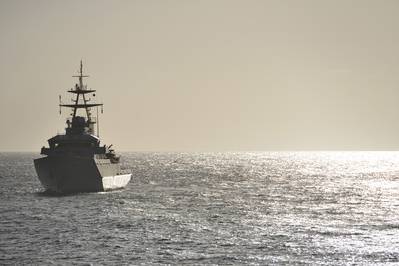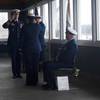Britain Foils Iranian Attempt to Block Tanker
Three Iranian vessels tried to block a BP-operated tanker passing through the Strait of Hormuz but backed off when confronted by a Royal Navy warship, the UK government said on Thursday.
Britain urged Iran to "de-escalate the situation in the region" after the British Heritage, a Suezmax oil tanker operated by BP under an Isle of Man flag, was approached.
"HMS Montrose was forced to position herself between the Iranian vessels and British Heritage and issue verbal warnings to the Iranian vessels, which then turned away," a British government spokesman said in a statement.
The incident followed President Donald Trump's warning he would soon "substantially" increase U.S. sanctions on Iran as part of a drive to curb Iran's nuclear program and force Tehran to change its regional behaviour.
The United States blames Iran for a series of attacks on shipping in the world's most important oil artery since mid-May, accusations Tehran rejects but which have raised fears the long-time foes could slip into direct military conflict.
The growing confrontation between Iran and the West took another twist last week when British Royal Marines seized an Iranian tanker, the Grace 1, off Gibraltar on suspicion that it was breaking EU sanctions by taking oil to Syria.
A senior Iranian military commander on Thursday said Britain and the United States would regret detaining the vessel, just days after the armed forces chief of staff said the action would not go unanswered.
Foreign Minister Mohammad Javad Zarif however dismissed as "worthless" on Thursday UK allegations Iran it had sought to block the British Heritage, the semi-official Fars news agency said.
KEY SHIPPING LANE
Tensions in the Gulf have been rising over recent weeks as Iran began to move away from the terms of the 2015 nuclear accord it struck with world powers.
The United States withdrew from the pact last year and extended sanctions against Iran, effectively driving Iran from mainstream oil markets and forcing it to find unconventional ways to sell crude, it's main revenue earner.
That has deprived Tehran of the economic benefits Iran was to accrue in return for curbing its nuclear program, and the Islamic Republic says it will only return to full compliance once sanctions are lifted and Washington rejoins the pact.
BP CEO Bob Dudley, asked about the situation in the Gulf at an event at London's Chatham House on Wednesday evening, said: "We've got to be super careful about our ships".
A BP spokesman said the oil major was not commenting on the latest event but added: "We thank the Royal Navy for their support."
An escalation in the Strait of Hormuz --linking Middle East oil producers with markets in Asia, Europe, North America and beyond -- could drive up crude prices.
Maritime security sources said Britain to protect shipping lanes but there was no formal policy yet of escorting all UK ships through the area. The Montrose was in the area to ensure the safe passage of UK flagged ships when needed, they added.
Refinitiv data shows four other UK registered tankers are currently present in the Gulf.
Bob Sanguinetti, chief executive with the UK Chamber of Shipping trade association, told Reuters the situation was tense and called for a de-escalation.
"UK shipowners are in regular contact with the relevant authorities and agencies regarding the security situation in the region, and we are confident that the RN (Royal Navy) will provide the necessary support to their vessels," he said.
Oman, which hosts a joint British military base and shares the Strait of Hormuz with Iran, did not immediately comment. It has mediated between Tehran and the West and also allows the British and U.S. navies to use its ports on the Arabian Sea.
"CLASH OF WILLS"
Heightened tension between Iran and the United States have fanned fears of increasing conflict in countries where Iran and its U.S.-backed Gulf Arab rivals have been locked in proxy battles for predominance in the Middle East.
Last month, Iran shot down a U.S. drone near the Strait of Hormuz and Trump aborted a retaliatory military strike, saying it could have killed 150 people. He has signalled he is open to talks with Tehran without preconditions an offer rejected by Iran's clerical leadership.
The United States is hoping to enlist allies in a military coalition to safeguard strategic waters off Iran and Yemen, Marine General Joseph Dunford, the chairman of the Joint Chiefs of Staff, said on Tuesday.
Britain, France and Germany have sought to avoid being dragged into U.S. sanctions but say Iran must return to full compliance with the 2015 nuclear deal they were instrumental in brokering.
They have so far avoided triggering a dispute resolution process contained in the deal but it could take new steps in the next two months, including restarting dismantled centrifuges and purifying uranium to a sharply higher threshold, unless it is allow to resume normal oil sales.
Francois Lecointre, the French armed forces chief, described the friction between the United States and France as a "clash of wills".
"I think it is under control now... I don't think it can spiral out of control but there can be escalation," he told CNews television.
By William Schomberg







